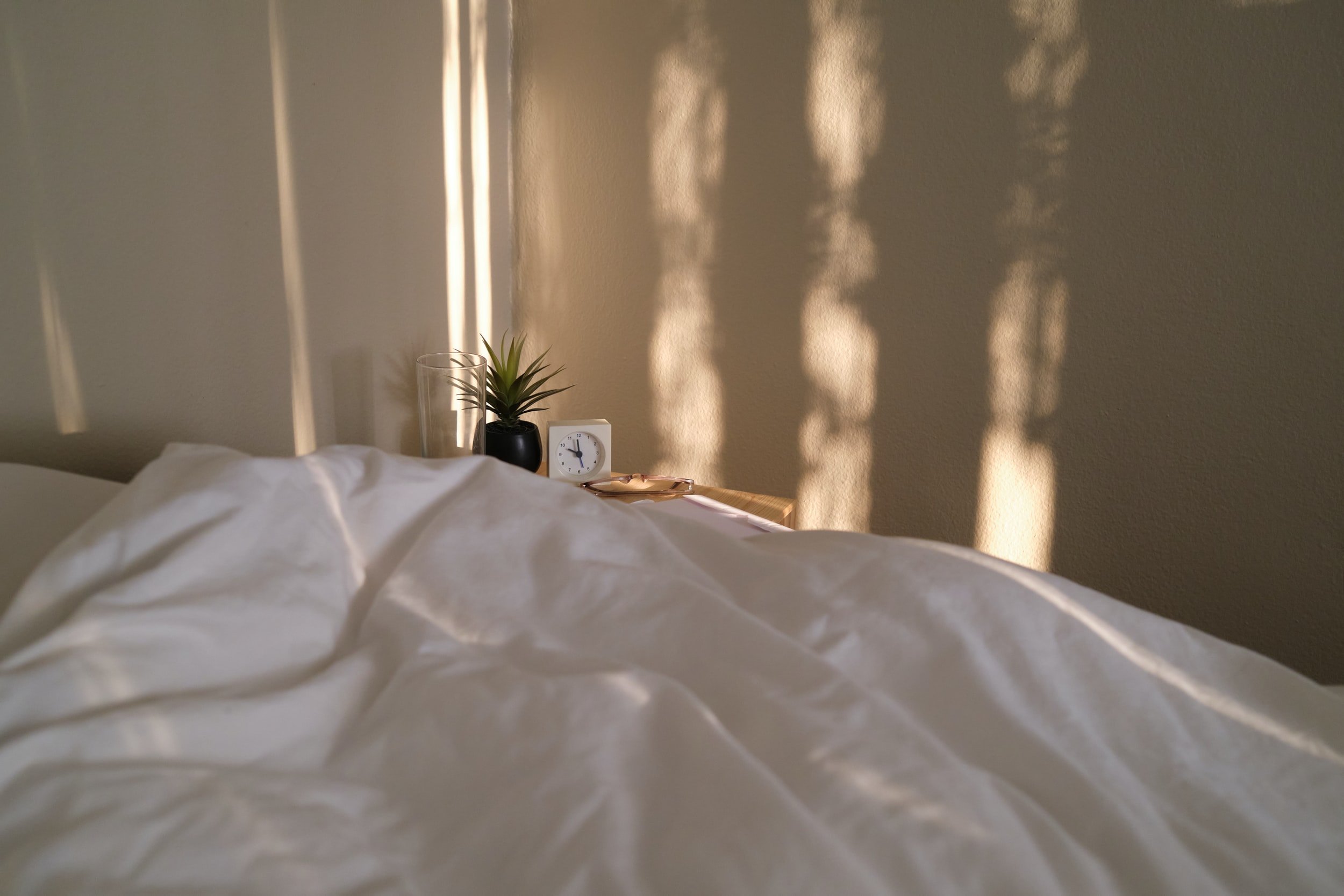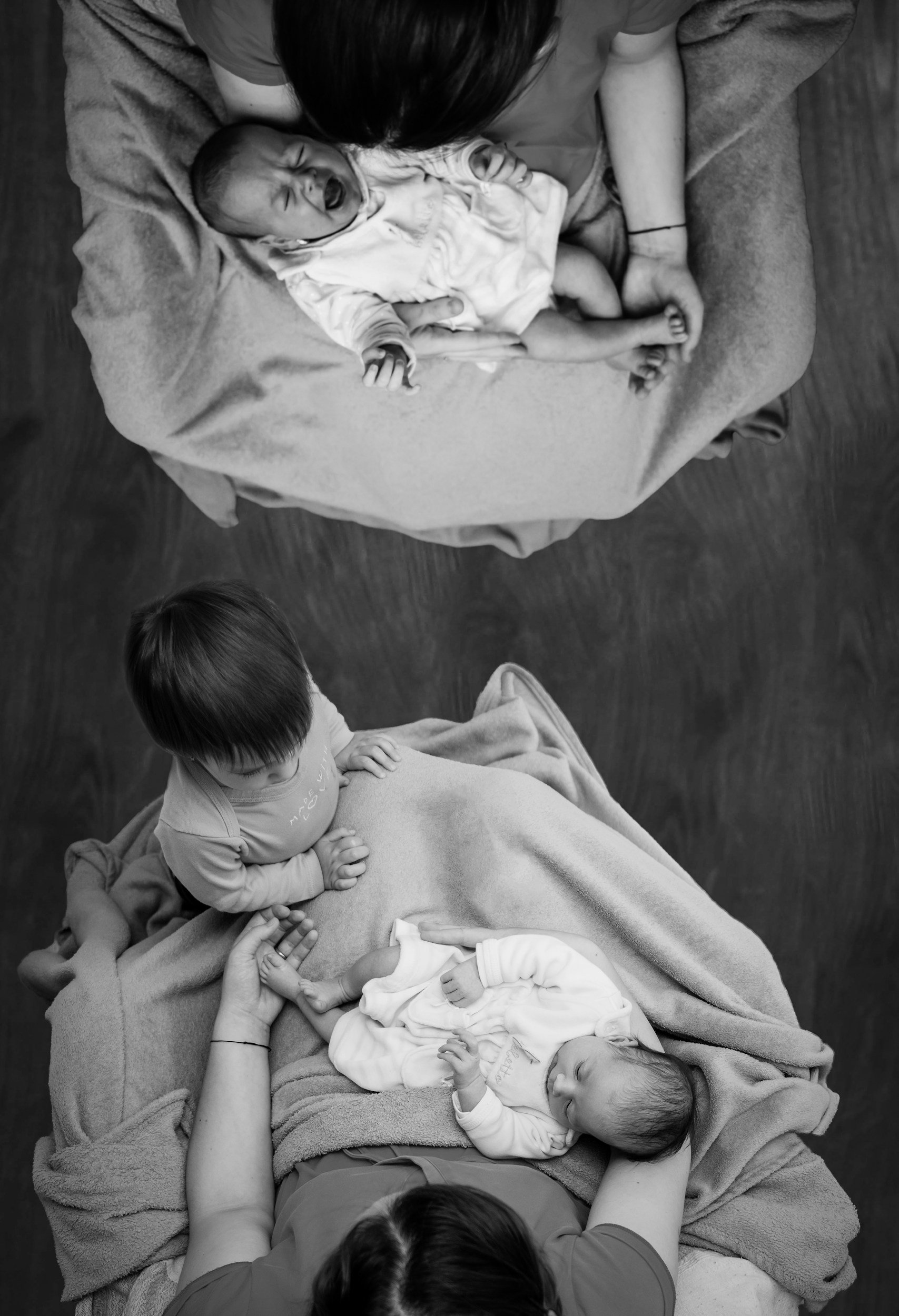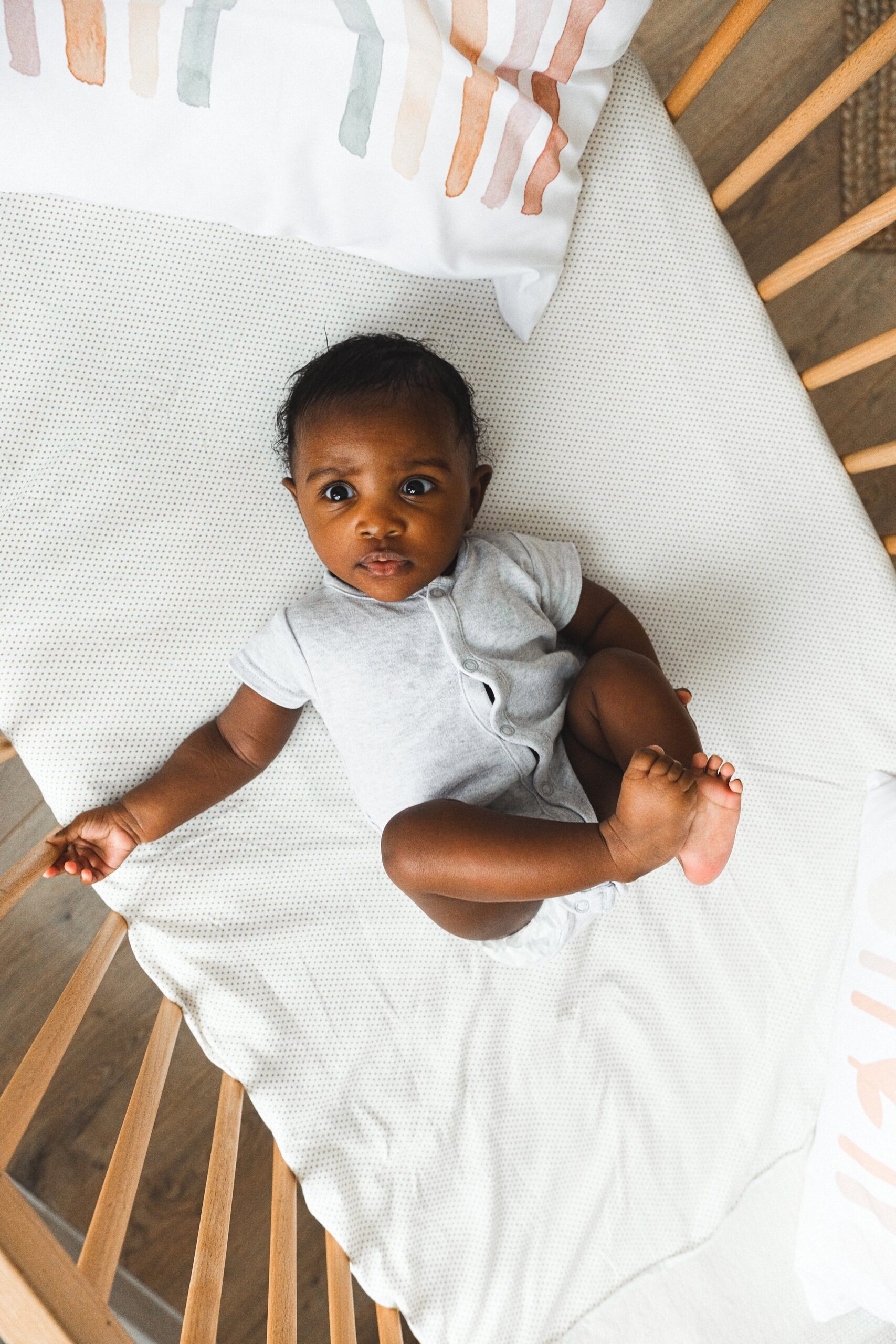I'm Rachael
Mom of 3 & Baby Sleep Expert with Big Sis Energy
& I’VE DONE ALL THE RESEARCH FOR YOU ALREADY.
Better sleep for the entire family
BROWSE COURSES
hey!
Overtired babies- how to know baby is overtired, and is a being overtired really Such a Big Deal?
in this post:
If you’ve done any googling or have followed any sleep trainer/ sleep coaching IG accounts, you’ve probably heard the word “overtired” a thousand times, usually to explain any sleep problem you may be having.
Overtiredness for babies has become a scapegoat for lots of sleep issues (many of which are simply normal behavior) but is it really such a big deal? Should parents really be so worried about overtiredness? Let’s take a look.

what is overtiredness in babies?
“Overtiredness” simply refers to a baby that has been awake for too long. Babies and young children typically nap throughout the day because they can only handle so much time awake. The longer a child is awake, hormones such as cortisol build up in the body. Essentially the body is saying “I’m still up- there must be something in the environment that I need to remain alert for- so here’s a bunch of hormones to help you stay awake!” This stress response can have some negative effects such as making it harder to calm down for a nap or bedtime. The release of cortisol when we become fatigued can also cause less time in slow-wave NREM (restorative) sleep once we do finally fall asleep. In addition, overtiredness can build throughout the day, so if the first nap is late for example, this can cause them to not sleep well for that nap, which sets off a less than ideal pattern for the rest of the day.
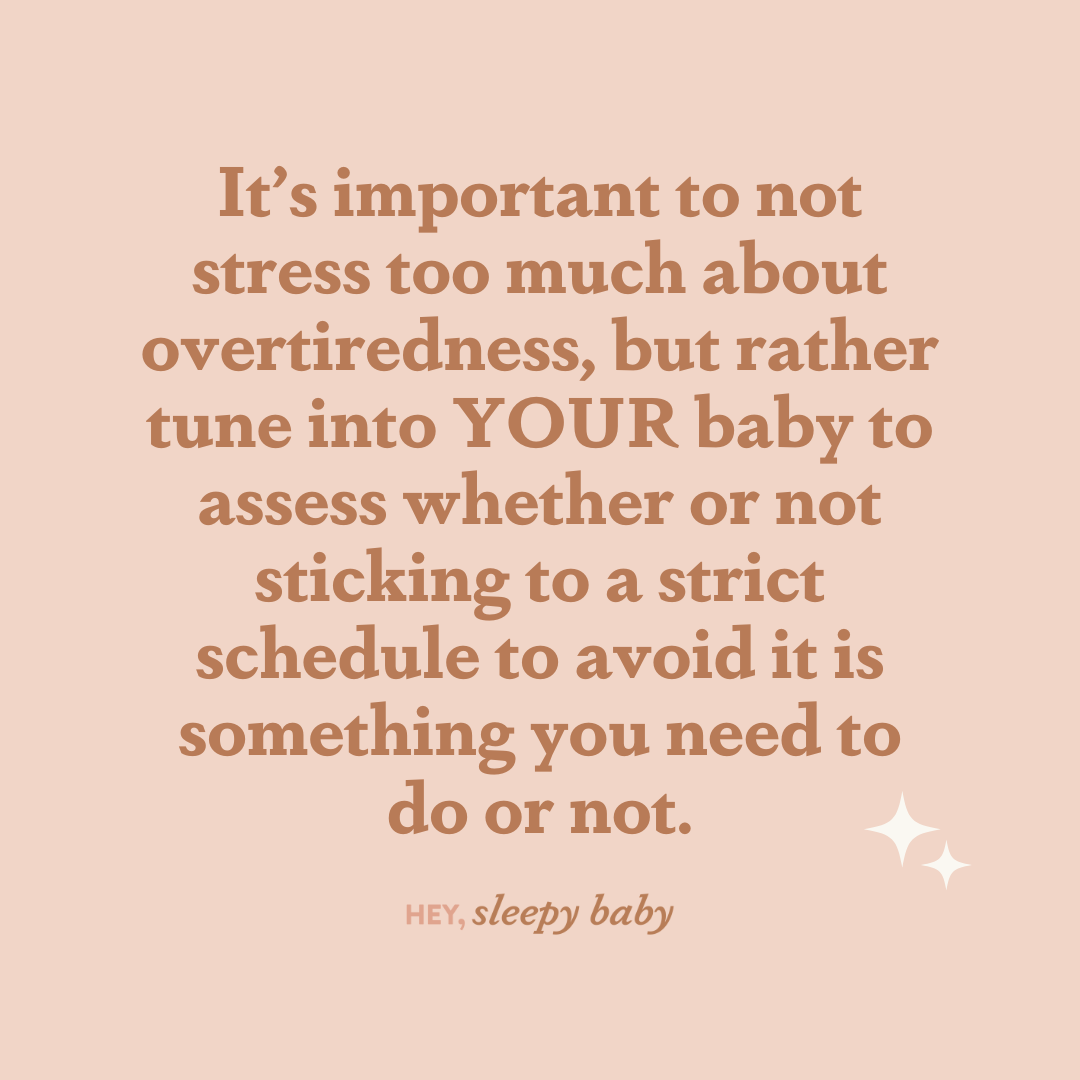
is being “overtired” really a thing?
It’s important to note that there isn’t really a robust body of evidence about overtiredness in babies. There’s not much we can draw from in terms of whether or not it’s “normal” or even if it’s harmful. Some experts say that it’s a myth, and not something parents should be thinking about. However, it’s just as important to look at people’s real lived experiences as it is to look at available research. Many, many parents notice a correlation between their babies being up for too long and having a hard time falling asleep and/or poor sleep. And some don’t! This is why it’s important to not stress too much about it, but rather tune into YOUR baby to assess whether or not sticking to a strict schedule to avoid overtiredness is something you need to do or not.
Is it bad for a baby to be overtired?
Overtiredness can cause less restorative sleep and less overall sleep in some children. This can be thought of as “sleep debt.” Your child can sink further into that hole as the day goes on if they are unable to make up for the lost sleep. This can affect sleep by altering the sleep architecture, shortening the duration of sleep, reducing NREM sleep, and causing early morning waking. If you’re experiencing chronic overtiredness and your baby has a lot of accumulated sleep debt, it can cause early wakings as a habit, which over time can alter the daily rhythm of cortisol levels. Parents with chronically overtired babies may notice that their babies are extremely fussy and hard to settle at sleep time, take a very long time to fall asleep, and/or have very disrupted/ short sleep durations. This can be a tough pattern to break out of to be sure.
However, it’s important to keep in mind that most babies do fine with the occasional short or missed nap or too-late bedtime. We don’t need to stress too much, or obsess over schedules or nap lengths to prevent occasional overtiredness. It happens, and it’s usually not the end of the world. Some children are more sensitive to becoming overly tired and you’ll notice big changes in their mood and quality of sleep, while others are completely unphased!

How do you Know if your Baby is Overtired?
This can be tricky to figure out because lots of “overtired” clues can also be baby being UNDER tired. Confusing right?! At times, babies will really fight sleep when they’re overtired. Other signs are really short naps with baby waking grumpy, more than normal night waking, and early morning rising.
A great way to make an educated guess is to know the average sleep totals for your baby’s age and to see if those fit. Note that 12 overnight hours is not actually the norm!
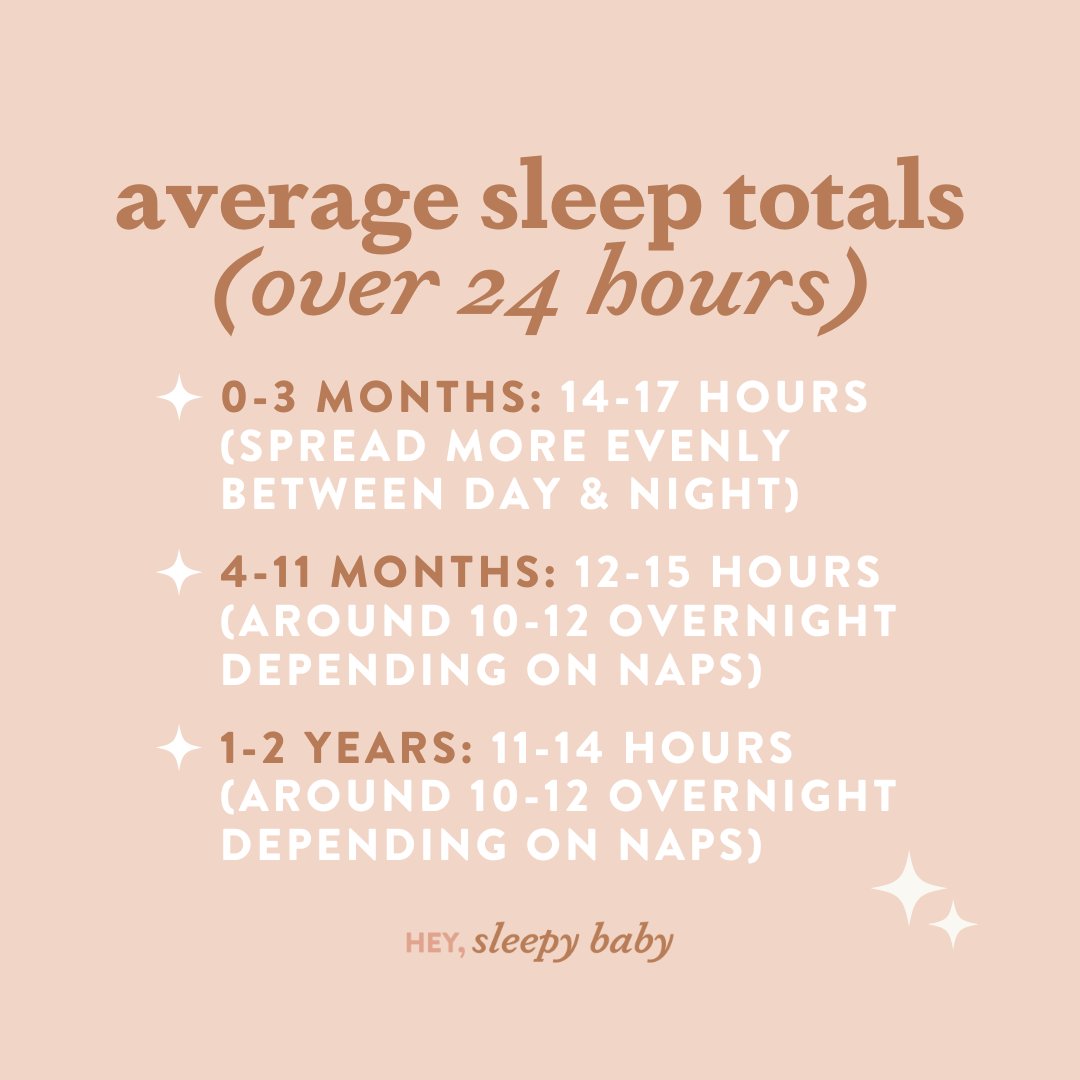
Average Sleep Totals (per 24 hours):
-
0-3 Months: 14-17 hours (spread more evenly between day & night)
-
4-11 Months: 12-15 hours (around 10-12 overnight depending on naps)
-
1-2 Years: 11-14 hours (around 10-12 overnight depending on naps)
Track a week or so of your baby’s sleep. Note the time they’re actually falling asleep (not when the routine starts!) for naps and bedtime, how long each nap is, and what time they wake in the morning. This should give you a good idea of their “average” total hours per 24.
Then, if your baby is getting what’s on the lower end of average AND you’re noticing the signs of overtiredness, you can safely assume they could be overtired. In this case you’d want to try shortening their wake windows, offering early bedtime, etc. If they’re on the high end of average total sleep, you might assume they are actually under tired and need their wake windows to be a bit longer, or for a nap to be capped or dropped.
Signs of Overtiredness Include:
-
high-pitched crying
-
frequent yawning
-
little interest in eating
-
being more emotional/ crying more than usual
-
collapse or total overwhelm
-
clumsiness
-
hyperactivity or hysteria
-
body stiffening
-
pushing off of you/ away
-
back arching
-
squirming
-
irritability
It’s important to rule out illness, though, as many of these signs will overlap with symptoms that need to be addressed with your healthcare provider. If you’re ever in doubt or concerned about your child exhibiting these behaviors, video record them and contact your doctor right away.
When babies are overtired, they’ll likely have a difficult time falling asleep and staying asleep. This is the main reason parents are so afraid of it happening! This happens because when babies are overtired or sleep deprived, the sleep latency (time it takes to fall asleep) decreases so babies go through sleep stages too quickly, and then they struggle with transitioning between sleep cycles for the rest of the night. Sleep deprivation increases the sleep pressure, meaning it might be easier to fall asleep (or at least quicker) but the sleep architecture itself is altered, with less total NREM sleep.
So many parents are scared of getting their babies overtired because of that whole “sleep begets sleep” idea that many articles and sleep trainer sites talk about. While it’s true that chronically overtired babies might have a hard time getting the sleep they need, some babies simply need less sleep than we think they do, especially those that are highly sensitive.
A Word on Highly Sensitive Babies and overtiredness:
It should be noted that highly sensitive (also called “high needs” “spirited” “sparkler” or “orchid”) babies sometimes do tend to become overtired and/or overstimulated more easily than their easy-going counterparts. This often tricks parents, though, because when they’re actually already overly stimulated or overtired, they may crave (and demand!) MORE stimulation.
German researcher Mechthild Papousek discovered that spirited babies actually “train” their parents to increase stimulation even though they’re almost always OVERLY stimulated! They might communicate to you- “Bounce me harder!” “Rock faster!” “Show me more things!” “Sing louder!” But in reality, they can work themselves into a frenzy of overstimulation this way, and need US to find the balance for them, knowing when to give them a break and help them wind down for sleep.
-
Sensitive babies often crave motion and are calmed by repetitive movement like swinging, bouncing, and rocking. They do well with very calm, serene sleep environments and slow-paced routines. I recommend these blackout curtains for the best sleep environment because they are thermal and sound insulating on top of being 100% blackout (use code heysleepybaby for 10% off).
-
These “sparkler” babies are intense. Every reaction, feeling, and emotion is strong and intense, whether it’s positive OR negative. They feel every emotion fully. They experience every smell, touch, or sensation deeply. Their arousal system is turbocharged. These babies might experience pain and discomfort more acutely (so they’re truly suffering when teething!) and crave touch and comfort.
-
Your spirited baby wants you to watch their cues vs. the clock. Even if they’ve just eaten, or just slept, believe them when they show you what they need. When pushed into the zone of “overarousal” these babies will get to the point of NOT being able to fall asleep or feed because they are so overtired or overstimulated.
-
These babies resist schedules with everything they’ve got. They might be awakened by the slightest creak in the floorboard. They might become upset easily and take forever to calm down. They are highly alert and the slightest thing could throw them off.
-
These babies have days where they seem to not nap at all. This can drive parents crazy so it’s important to prioritize self-care if this is your little one!

How To Get Out of the Cycle of overtiredness and ‘“sleep debt”
So how do you break the cycle of overtiredness and start to pay back that “sleep debt?” Unfortunately, overtiredness can build throughout the day and can set into motion a vicious cycle of early bedtimes and early wakings. This then sets off the natural daily rhythm of cortisol release and can cause a habit of early rising- which no one wants!
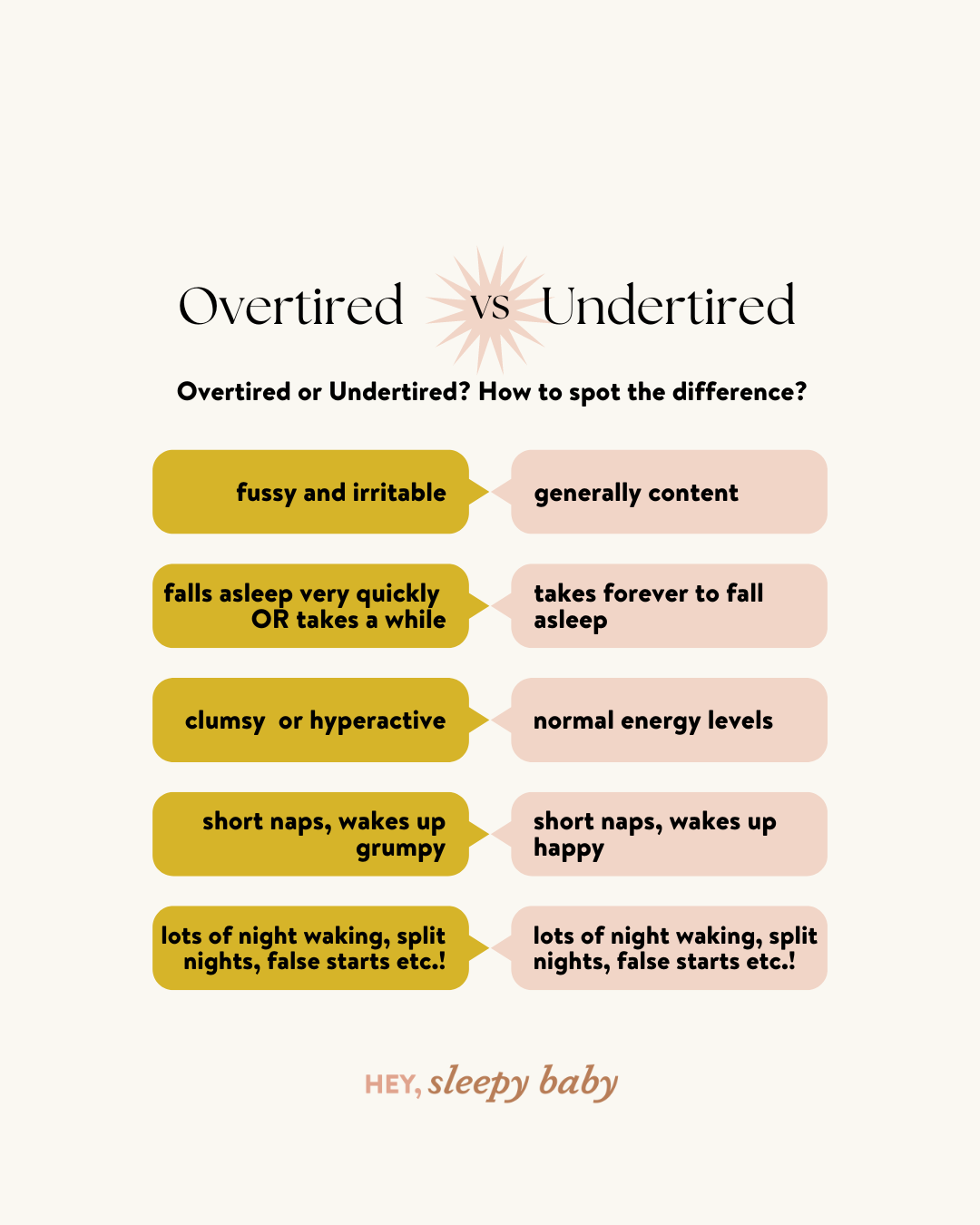
-
Learn your baby’s earlier sleepy cues like gaze aversion, loss of interest in play, glazed over look, going quiet, or reddening eyebrows.
-
Protect the first nap. If you can give your baby a predictable wake up time and first nap time, it can really help with overarousal/ overtiredness for the whole day! This might mean waking your baby up within the same 20-30 minutes each day so that the day can get started. “Protecting” the first nap means that if you can, be sure the first nap is a nice restorative one. If you have the option, stay home, contact nap, or do whatever else it is that helps your child sleep best. Starting the day with a solid first nap helps set up the rest of the day!
-
Be sure your baby gets adequate wind-down time before naps and has wake windows that aren’t too much for them. You could try tracking a few days to see if you notice any patterns- this can help you find the sweet spot. Don’t pay too much attention to wake window “averages” because every baby is unique! Aim for a sleep latency of 15-20 minutes (time it takes baby to fall asleep). This is a good clue you’ve timed it well.
-
Establish simple, calming routines. Things like the bath, songs, books, etc. are great for many- but might be too stimulating depending on your baby! Find what works for your baby. What calms you? What calms them? Remember that baby is so in sync with our emotions and arousal level. If we’re stressed and rushing the routine, they’ll struggle to fall asleep big time!
-
Allow sleep wherever and however it works best. Contact nap? Car ride? Babywearing on a walk? Do whatever you need to do (and whatever is possible for you to do) to get your baby the rest they need. Once they’re “caught up” and out of the woods of overtiredness, you can nudge toward sleeping in a crib if that’s your choice. Now is not the time to push it!
-
Always calm yourself first. Overtiredness can happen, and your baby might fight sleep a bit more than usual. This can be really frustrating! Go into the routine with a mantra or another trick or coping strategy to keep yourself grounded. This will really make all the difference!
Tired parents, here’s the bottom line. Definitely keep overtiredness in mind as something to avoid if possible, but remember that most tired babies will sleep, and very few are chronically overtired or clinically sleep deprived. For most babies, becoming overtired sometimes is not a big deal and they can recover the next day. Let go of this fear a little bit and follow your baby’s cues above all else!
If you’re looking for all the information you’ll need from the newborn stage through toddlerhood, check out the Newborn Masterclass which is the Essential Baby Sleep Course for New + Expecting Parents OR grab the Baby Bundle to set yourself up for the newborn phase. With this option you’ll get all the great stuff in the Newborn Masterclass PLUS The Ultimate Crib & Bed Guide.
Featured
When daylight saving time ends, we “fall back” one hour, meaning that sunrise and sunset will occur an hour earlier. How will this affect your baby’s sleep?
Responsive sleep tips and support for parents of multiples or twins.
What are floor beds? When to use them? And How to use them?
Was this helpful? Save it for later!
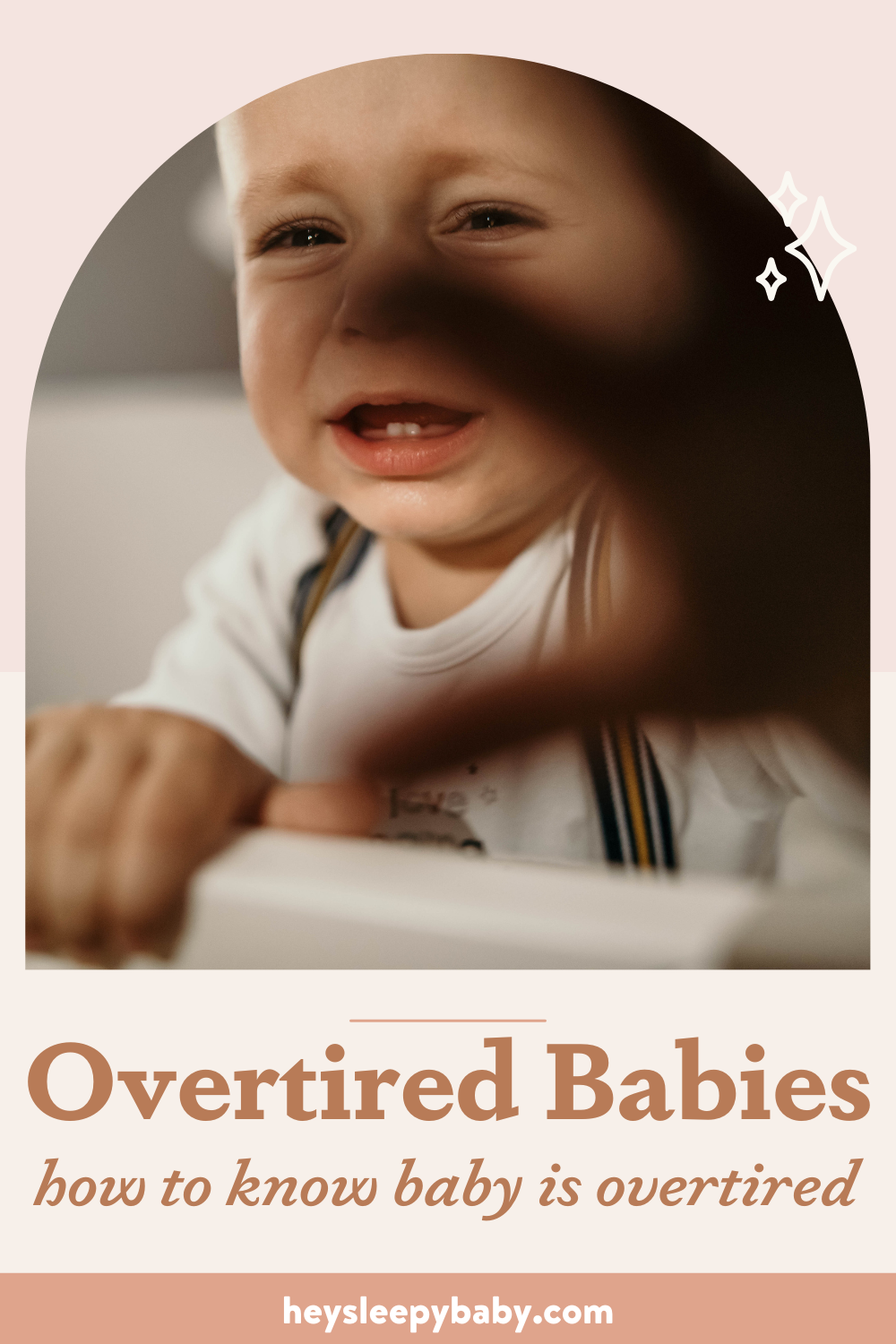
Sources:
HOOKWAY, L. (2018). HOLISTIC SLEEP COACHING – GENTLE ALTERNATIVES TO SLEEP TRAINING: For health & childcare … professionals. TX: PRAECLARUS Press.
Kurcinka, M. S. (2020). Raising your spirited baby: A breakthrough guide to understanding the needs of healthy babies who are more alert, intense, and energetic, and struggle to sleep. New York, NY: William Morrow.
binge reads
We think you'll love these
You deserve to the
baby stage, not just "survive it."
And you DON'T have to sacrifice your values, ignore your instincts, or force yourself to follow a method you don't align with just to get your baby back to sleep.
I’m here to help you create a restful, sustainable sleep environment that honors both your baby’s needs AND your own (without the stress OR the guilt!) because, no, you don’t have to choose between the two.
enjoy!
BABY SLEEP COURSES →
BABY SLEEP CONSULTS →
Wish you could help your baby sleep better without resorting to sleep training? Download my FREE guide to a good night’s sleep and learn 8 simple, science-backed tips for supporting your child’s needs.
Traditional sleep training methods don’t have to be your solution to better sleep.
SLEEP TRAINING ISN’T THE ONLY WAY TO GET GOOD SLEEP
Hey, I'm Rachael and Hey, Sleepy Baby is for parents who want to get their nights back, without sleep training their babies.
NO ONE TOLD US POD
explorING the untold truths of parenting
